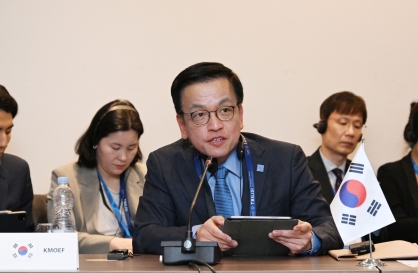Japan on Tuesday marked the 64th anniversary of the enforcement of the postwar Constitution just as the entire nation, including its people, private enterprises, and the central and local governments, is struggling to overcome the consequences of the March 11 earthquake and tsunami that devastated northeastern Japan.
The anniversary also came at a time when the lives of the people in Fukushima Prefecture are being severely disrupted by the radioactive materials released from Tokyo Electric Power Co.’s Fukushima No. 1 nuclear power plant, which developed a major nuclear crisis when its power sources to cool the reactors were damaged by the tsunami.
According to the National Police Agency, more than 25,000 people died or went missing in the March 11 disasters. Many people also lost their property and their jobs. More than 126,000 evacuees are still housed in temporary shelters ― after more than 50 days have passed since the catastrophe struck.
Article 27 of the Constitution says that “All people shall have the right and the obligation to work” and Article 29 says that “The right to own or to hold property is inviolable.” Those people’s suffering was caused not by human or government actions but by the terrible power of nature. But the victims are without the basic rights guaranteed by the Constitution.
Along with the no-war principle, the Constitution, promulgated on Nov. 3, 1946, and put into force on May 3, 1947, contains an important principle of the right to the minimum standards of living. Article 25 says, “All people shall have the right to maintain the minimum standards of wholesome and cultured living. In all spheres of life, the State shall use its endeavors for the promotion and extension of social welfare and security, and of public health.”
The first sentence of this article was not in the draft Constitution prepared by the headquarters of the Occupation forces. Japanese lawmakers inserted this sentence through their Diet deliberations ― an important testimony that undermines an idea propagated by some that the Japanese just passively accepted as their new Constitution what the Occupation forces headquarters had written and imposed on them.
Despite the lawmakers’ determination to improve the lives of people by including the right to the minimum standards of wholesome and cultured life in the Constitution, it is clear that the conditions of people in temporary shelters are far from what the article envisages. Even if they relocate to temporary housing, one cannot say that they will come to enjoy the living conditions as stated in Article 25. They will be forced to live under harsh conditions for many years to come.
Attention should also be paid to the situation of people in Fukushima Prefecture who were forced to evacuate their homes because of the establishment of the non-entry zone around the Fukushima No. 1 nuclear power station. The evacuation is causing many of them to lose their means of making a living. These people were not responsible for the crisis at Fukushima No. 1, but they have been forced to suffer from the consequences of the nuclear calamity. Many children in the prefecture are being deprived of their right to a normal education without fear of threats to their health.
In August 1945, the atomic bombings turned the people of Hiroshima and Nagasaki into victims of nuclear fission. Today, nuclear power generation has made the people of Fukushima the latest victims of nuclear fission. It will be a sad chapter in Japanese history if Fukushima is remembered alongside Hiroshima and Nagasaki as a place associated with a nuclear tragedy.
Article 13 of the Constitution says that all of the people shall be respected as individuals and guarantees people’s rights to life, liberty and the pursuit of happiness. A condition is attached to the realization of these rights. The article says that to the extent they do not interfere with the public welfare, they shall be the supreme consideration in legislations and in other government affairs.
As a general principle, Article 13 may be correct. But it should be remembered that what is promoted under the name of the public welfare can undermine the true public welfare. It is not far-fetched to say that the central government and the power industry have pushed nuclear power on the strength of the argument that it is for the sake of promoting the public welfare. But what happened at Fukushima No. 1 has greatly violated people’s rights to life, liberty and the pursuit of happiness and seriously damaged the public welfare.
It is clear that the government must quickly take well thought out measures to help and improve the lives of the victims of the triple disaster of the earthquake, tsunami and nuclear crisis.
Apart from the triple disaster, Japan has been facing various social problems, including the so-called working poor, an increase in the number of temporary workers, the deterioration of medical and social welfare services, and the weakening of the social fabric because of economic and technological changes.
It is time for the government, the private sector and citizens to seriously consider ways to realize the ideal expressed by Article 25 of the Constitution.
(Editorial, The Japan Times)
The anniversary also came at a time when the lives of the people in Fukushima Prefecture are being severely disrupted by the radioactive materials released from Tokyo Electric Power Co.’s Fukushima No. 1 nuclear power plant, which developed a major nuclear crisis when its power sources to cool the reactors were damaged by the tsunami.
According to the National Police Agency, more than 25,000 people died or went missing in the March 11 disasters. Many people also lost their property and their jobs. More than 126,000 evacuees are still housed in temporary shelters ― after more than 50 days have passed since the catastrophe struck.
Article 27 of the Constitution says that “All people shall have the right and the obligation to work” and Article 29 says that “The right to own or to hold property is inviolable.” Those people’s suffering was caused not by human or government actions but by the terrible power of nature. But the victims are without the basic rights guaranteed by the Constitution.
Along with the no-war principle, the Constitution, promulgated on Nov. 3, 1946, and put into force on May 3, 1947, contains an important principle of the right to the minimum standards of living. Article 25 says, “All people shall have the right to maintain the minimum standards of wholesome and cultured living. In all spheres of life, the State shall use its endeavors for the promotion and extension of social welfare and security, and of public health.”
The first sentence of this article was not in the draft Constitution prepared by the headquarters of the Occupation forces. Japanese lawmakers inserted this sentence through their Diet deliberations ― an important testimony that undermines an idea propagated by some that the Japanese just passively accepted as their new Constitution what the Occupation forces headquarters had written and imposed on them.
Despite the lawmakers’ determination to improve the lives of people by including the right to the minimum standards of wholesome and cultured life in the Constitution, it is clear that the conditions of people in temporary shelters are far from what the article envisages. Even if they relocate to temporary housing, one cannot say that they will come to enjoy the living conditions as stated in Article 25. They will be forced to live under harsh conditions for many years to come.
Attention should also be paid to the situation of people in Fukushima Prefecture who were forced to evacuate their homes because of the establishment of the non-entry zone around the Fukushima No. 1 nuclear power station. The evacuation is causing many of them to lose their means of making a living. These people were not responsible for the crisis at Fukushima No. 1, but they have been forced to suffer from the consequences of the nuclear calamity. Many children in the prefecture are being deprived of their right to a normal education without fear of threats to their health.
In August 1945, the atomic bombings turned the people of Hiroshima and Nagasaki into victims of nuclear fission. Today, nuclear power generation has made the people of Fukushima the latest victims of nuclear fission. It will be a sad chapter in Japanese history if Fukushima is remembered alongside Hiroshima and Nagasaki as a place associated with a nuclear tragedy.
Article 13 of the Constitution says that all of the people shall be respected as individuals and guarantees people’s rights to life, liberty and the pursuit of happiness. A condition is attached to the realization of these rights. The article says that to the extent they do not interfere with the public welfare, they shall be the supreme consideration in legislations and in other government affairs.
As a general principle, Article 13 may be correct. But it should be remembered that what is promoted under the name of the public welfare can undermine the true public welfare. It is not far-fetched to say that the central government and the power industry have pushed nuclear power on the strength of the argument that it is for the sake of promoting the public welfare. But what happened at Fukushima No. 1 has greatly violated people’s rights to life, liberty and the pursuit of happiness and seriously damaged the public welfare.
It is clear that the government must quickly take well thought out measures to help and improve the lives of the victims of the triple disaster of the earthquake, tsunami and nuclear crisis.
Apart from the triple disaster, Japan has been facing various social problems, including the so-called working poor, an increase in the number of temporary workers, the deterioration of medical and social welfare services, and the weakening of the social fabric because of economic and technological changes.
It is time for the government, the private sector and citizens to seriously consider ways to realize the ideal expressed by Article 25 of the Constitution.
(Editorial, The Japan Times)





![[Weekender] Korean psyche untangled: Musok](http://res.heraldm.com/phpwas/restmb_idxmake.php?idx=644&simg=/content/image/2024/05/02/20240502050841_0.jpg&u=)

![[Eye Interview] 'If you live to 100, you might as well be happy,' says 88-year-old bestselling essayist](http://res.heraldm.com/phpwas/restmb_idxmake.php?idx=644&simg=/content/image/2024/05/03/20240503050674_0.jpg&u=)









![[Herald Interview] Director of 'Goodbye Earth' aimed to ask how we would face apocalypse](http://res.heraldm.com/phpwas/restmb_idxmake.php?idx=652&simg=/content/image/2024/05/03/20240503050732_0.jpg&u=)
